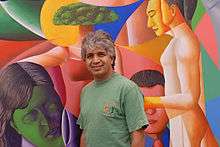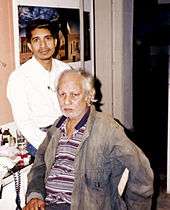Muhammad Arshad Khan
| Muhammad Arshad Khan (MAK) | |
|---|---|
.jpg) | |
| Born |
October 14, 1969 Pontia, Topi, Khyber Pakhtunkhwa, Pakistan |
| Residence | Karachi |
| Nationality | Pakistani |
| Occupation | Painter & Social Worker |
Muhammad Arshad Khan (Urdu: : محمد ارشد خان, born October 14, 1969) known as MAK,[1] is a Pakistani artist, painter, sculptor, social worker and the president of the Pakistan national committee for the World Art Games.[2] He has painted several paintings, did not go to any art college and learnt painting from Bashir Mirza.[1] His style of painting is identified by certain section as Mak Art.[3][4]
Early life and education
Muhammad Arshad Khan is the son of Muhammad Azam Khan, born in Pontia, Tehsil Topi, District Swabi Khyber Pukhtunkhwa on October 14, 1969. (His official birth date is February 16, 1972).[4] He spent few early years in Karachi, then his family shifted to Topi where he grew up in Mohallah Serai (a labour colony of Pukhtoon Society).[5]
He studied at Government Primary School Shaheedan Topi, Government High School Topi, from where he obtained his secondary school certificate in 1988. After qualifying intermediate examination from Peshawar Board, he studied Sociology as a major subject, along with Mass Communication,Community Development and Urban Sociology as specialized subjects in Bachelor of Arts (Honors) in Karachi University. In 1996, he earned a Master of Arts degree.[6] He did research thesis titiled "Study of The Factors Effecting Maternal and Infant Health in Low Income Groups of Urban" to qualify for masters degree. Presently, he resides in New Muzzafar Abad Colony, Landhi Industrial Area, Karachi.[6]
Career as artist


He was better in drawings among his school mates but he couldn't attend arts school to learn drawing academically. Khalid Zaman brought him to Karachi.[7] At Karachi, he involved in arts/theater as an actor, under the guidance of Ahmed Farooqui, an actor qualified at Poonum Arts School.[7]
Soon after graduating from Karachi University, he took appointment in TCS. He got an opportunity to become a student of presidential Performance Award winner, painter and Ex-Cultural Attaché for Australia Mr. Bashir Mirza.[1] Bashir Mirza started teaching him drawings and paintings from September 1997 till his death on January 5, 2000.[8] He had also taken some classes from Nayyer Jameel.[9]
He was introduced to the "Sunday gathering" at Indus Gallery by Bashir Mirza in 1997, where regular members Ali Imam, Bashir Mirza, Saleem Asmi, Professor Dr. Haroon, M. M. Usmani, Suleman Ganchi, Iqbal Jaffery, Aftab Tapal, Tasaduq Sohail and other national, as well as international, artists and celebrities interacted about arts.[7]
Besides this, Mak uses his art to give tributes to his ideals. Mak accompanied with his other mates take part in exhibitions at Karachi and in other cities.[10]
Community service
Ranrraa Development Trust
"Ranrraa", established in 2006, is basically a Pashto word which has multiple meanings as Light, Sacred Conception and Bright Vision etc.[1][11] He associated with the trust to help students affected by terrorism. "The mission of trust is to boost up the morale and life standard of the students directly affected by terrorism in Swat and Waziristan and ... restart the life circle."[5] RDT always tried to create awareness among people about the issues, gave opportunity to students so they could study in a calm atmosphere and look forward to their promising future.[12] Besides this, RDT also executed campaigns in order to create awareness.
Anti-Toy Gun Campaign
Toy guns are seen in the streets of Karachi, Mak raised voice through RDT against toy guns as they train children for violence.[13][14][15] In festivals, the sale of these gun increases and is frequently used as a play tool by the kids in karachi.[16][17][18] RDT lifted up the banners at Press Club to stop toy guns and to save children.[19] Further, in an interview mak told BBC, "If you are buying the gun, you are training five-year-olds to put a bullet in the chamber and fire shots. After using the toy gun, a child can easily use a real one."[20]
Pukhtoon Thinkers Forum
Muhammad Arshad Khan is a founder member, Cultural and Literary Secretary of Pukhtoon Thinkers Forum,[1] which was established on November 16, 2007.[21] It is a non-profit organization established to promote philosophy of non-violence, specially the version practiced Khan Abdul Ghaffar Khan, Pakhto to Pakhto,[22] literature, culture and arts.[23][23] Pukhtoon thinkers forum worked for the literature of Pashto and provided books to the corner.[24] The Forum also translated several books and organized several events.[25] PTF paid tributes to the great Poets with the help of Seminar and organizing events.[26] In an Interview with The Express Tribune, Mak said, "We wish for such events to act as a bridge between our culture and that of others"[27]
References
- 1 2 3 4 5 Khattak, Shoukat Iqbal (December 1, 2011), "A lesson in artistic realism", The News, retrieved August 16, 2012
- ↑ "Pakistan", World Art Games, wagames.org, retrieved August 16, 2012
- ↑ Hussain, Marjorie (2006), The Last of the Bohemians, Karachi: Post Office Foundation Press, p. 113
- 1 2 Rehman, Zia Ur (2011), Insani Tehzeebi Taraqqi, Karachi, Pakistan: Hum Shehri, p. 35
- 1 2 Khan, Zia (May 6, 2012), Interview with Zia, Mast FM 103
- 1 2 Buneri, Rehman (December 17, 2011), "A Pukhtun artist" (MP3), Voice of America
- 1 2 3 Khan, Rehan (2010), Mak and art, Karachi: Ummat Publications, p. 3
- ↑ Khan, Zaka (February 1, 2009), "Musawweri", Aajkal, 49 (2), p. 4
- ↑ Lisa, Mona (February 2008), "Motives of Peace", SHE Megazine(Monthly), 14 (2)
- ↑ Khan, Hidyat. "Celebrating the poets: Exhibitions". The Express tribune. Retrieved March 31, 2015.
- ↑ Zaka, khan (2010), Rannrra Development Trust, Karachi: Ummat Publications, p. 3
- ↑ Khattak, Sohail. "Keys to Ranrraa unlock promising future for students". The Express tribune. Retrieved March 31, 2015.
- ↑ "Pakistan Goes After Toy Guns to Prevent Kids' Militant Aspirations". The Atlantic. Retrieved April 1, 2015.
- ↑ Abubakar Siddique, Zafar Karimi, Shabbir Jan. "Pakistani Activists Take Aim at Toy Guns". Radio Free Europe. Retrieved April 1, 2015.
- ↑ Kareemi, Zafar. "Da Jali topako zad". Mashaal radio. Retrieved March 31, 2015.
- ↑ "With Eid around the corner, sales of toy guns goes up". The Express Tribune. Retrieved April 1, 2015.
- ↑ "Interview with Mak". Mashal radio. Retrieved March 31, 2015.
- ↑ "UCA news". Uca news. Retrieved April 1, 2015.
- ↑ "Banners at Press Club". Sindh Express. Retrieved April 1, 2015.
- ↑ "Bid to ban replica guns for kids". BBC. BBC. Retrieved April 1, 2015.
- ↑ Staff, Reporter (June 26, 2012), Jang News, Karachi: Daily Jung Newspaper, p. 4, retrieved August 17, 2012
- ↑ "LITERACY AMONG ETHNIC GROUPS: Formula for peaceful coexistence". Dawn. Retrieved April 1, 2015.
- 1 2 "PTF". Daily Jang. Retrieved July 29, 2013.
- ↑ "Pakistan Academy of Letters makes space for Pashto literature". The Express Tribune. Retrieved April 1, 2015.
- ↑ "Khudai Khitmatgar Tehreek book translated by Qasim Jan". Dawn. Retrieved April 1, 2015.
- ↑ "Tributes paid to great Pashto poets". The News. Retrieved April 1, 2015.
- ↑ "If Khushal Khattak and Ghani Khan were published in English, Pukhtuns' image will surely change'". Express Tribune. Retrieved April 1, 2015.